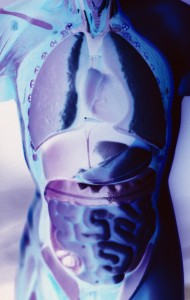Do you have problems with indigestion? If so, you’re not alone. According to Johns Hopkins, digestive problems account for about 5% of all visits to U.S. primary care doctors every year. That might not sound like a lot, but considering there were nearly 600 million visits to primary care physician’s offices in 2009 – which doesn’t include specialists, hospital visits, ERs, and so on – you can see that indigestion is a major problem. And, in fact, it could be causing major health problems you don’t even suspect are related to your gut.
The symptoms usually associated with indigestion are things like heartburn, nausea, bloating, belching, vomiting, constipation, diarrhea, and stomach aches or discomfort. True, these are all indications that something’s not right with the digestive tract, and they need to be checked out.
 But some people with digestive problems have symptoms you would never associate with the gut.
But some people with digestive problems have symptoms you would never associate with the gut.
Symptoms of leaky gut syndrome, for example, a condition where the lining of the digestive tract becomes more permeable, has symptoms like immune deficiency, chronic muscle pain, skin rashes, joint pain, fatigue, and even bed-wetting.
Nevertheless, it’s a digestive problem.
In fact, the digestive system affects much more than most people are aware. It’s not just a matter of stomach or gut discomfort, to be treated with a few over-the-counter aids that may give you some temporary symptoms relief. It can be a serious situation that could lead to just about every kind of degenerative disease or other health problem.
Why is digestion so important?
It’s well known that your health depends on whether or not your body is properly nourished. Like a car, or any other machine, it needs fuel to run.
Nourishment starts with eating foods that contain high levels of nutrients, and not a lot of antinutrients – natural or synthetic compounds that interfere with the absorption of nutrients.
Unfortunately, this does not describe the average American diet. Packaged, canned, and heavily processed foods have had the needed vitamins, minerals, digestive enzymes and other nutrients stripped right out of them. Plus, they’ve been grown with or have had antinutrients added. Many ‘foods’ could even be considered more ‘antinutritious’ than nutritious.
But no matter how good a diet you have, your body can’t use the food unless it’s broken down into minute particles that can penetrate into the blood stream and be carried to the cells.
This starts with the process of digestion.
The digestive system is also home to good bacteria – the kind that gets rid of the bad stuff.
If you have any health condition whatsoever – it doesn’t matter how unrelated to indigestion it might seem – you should always have your digestive process fully checked out.
Not only could digestive problems be contributing to your condition, they might even stop you from being able to absorb and utilize whatever you take to get healthy.
Indigestion can usually be addressed fairly easily. Proper diet, exercise, and nutritional supplements specifically designed to heal the digestive system and process can make a big difference in a short time.
Of course, you should always have your symptoms checked out directly, but no matter what else is wrong, always include the digestive system in your solution.
Permission is granted to repost this article in its entirety with credit to Wellness Truth Network and a clickable link back to this page. Wellness Truth Network was founded to protect your right to natural health remedies as well as enlighten readers on FTC and FDA censorship